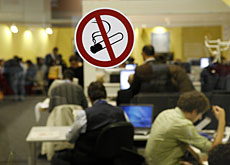Swiss improve tobacco control but lag behind

Switzerland has gained six places in a European league table on tobacco control. But in 18th position it lies in the bottom half of the 30 countries investigated.
Too many politicians are ignoring the wishes of the great majority of the people who want greater protection from smoking, according to the Swiss Cancer League.
At the top of the scale – presented in Basel at the opening of the Fourth European Conference on Tobacco or Health – came Britain, Ireland and Iceland.
The ranking takes into account such elements as price, public place bans, information campaign spending, advertising bans, health warnings and treatment to help dependent smokers stop.
Switzerland ranks below the average in terms of price of tobacco, public place bans and advertising bans but does well in other areas.
A communiqué on Thursday said Switzerland had improved its tobacco control spending, health warnings and treatment provision.
Passive smoking
The Swiss Cancer League says last week’s decision by the House of Representatives in favour of a watered-down law on passive smoking was not going to help the country improve its ranking.
“A draft proposal was approved that lagged well behind the demands that we were making,” commented the league’s president, Thomas Cerny, in an introductory session.
The law stopped short of a blanket ban. It allows smoking rooms and smoking in designated offices and public houses. Restaurants and nightclubs may continue as places to smoke provided permission has been granted.
“This draft simply ignored the opinion of the majority of the population who were calling for much greater protection against passive smoking,” said Cerny.
“Too many politicians still appear to ignore this, even though we were able to show that a smoke-free catering and gastronomy sector can function in Switzerland as well.”
Cerny pointed out that in canton such as Ticino – which has some of the toughest legislation on the issue – “pioneering work” had been carried out with an “amazing lack of fuss”.
He also noted that tourists coming to Switzerland from countries with stricter laws were “perplexed” that in an otherwise exemplary clean country, smokers were allowed to “dominate the public arena”.
Debate open
The director of the Federal Health Office, Thomas Zeltner, told the conference that the outcome of the parliamentary debate on extensive national protection in Switzerland remained open and that Switzerland was making progress.
“The number of smokers is falling… in 2006 some 250,000 fewer people smoked in Switzerland than in 2001. Significantly enough, 53 per cent of all smokers would like to give up smoking,” he said.
Zeltner said Switzerland stood by its commitment to fight “the epidemic of tobacco use”.
“According to Interior Minister Pascal Couchepin, the number of smokers must be reduced in the medium term to between 20 and 25 per cent. Ratification of the WHO Tobacco Convention will help us to achieve that aim.
“We want to bring the programmes that are currently up and running to a successful conclusion. They include the introduction of comprehensive protection for non-smokers,” he added.
Zeltner also said that even though conference participants would only come across a few smoke-free restaurants in Basel, a great deal of action had already been taken in Switzerland to implement the global World Health Organization strategy.
“I am confident that if you pay a visit to our country as a holiday destination in the next few years you will encounter a Switzerland which is even freer from smoke.”
swissinfo
About 8,300 people die from tobacco consumption in Switzerland annually.
There are around 16,000 cases of disability attributable to smoking.
Overall costs of tobacco consumption are around SFr10 billion ($8.47 billion).
The number of lost working days in the country as a result of smoking is estimated at four million.
The scale, the work of tobacco control expert Luc Joossens of the Association of European Cancer Leagues in Belgium, covers 30 European countries and follows a first survey carried out in 2005.
Switzerland gained 47 out of a possible 100 points. This included 14 (out of a possible 30) for price, 6 (22) on public place bans, 10 (15) on public information campaign spending, 4 (13) on advertising bans, 6 (10) on health warnings and 7 (10) on treatment to help dependent smokers stop.
Britain (93), Ireland (74), Iceland (74), Norway (62) and Malta (62) were at the top of the table.
At the bottom of the scale came Slovenia (40), Germany (37), Greece (36), Luxembourg (36) and Austria (35).

In compliance with the JTI standards
More: SWI swissinfo.ch certified by the Journalism Trust Initiative











You can find an overview of ongoing debates with our journalists here . Please join us!
If you want to start a conversation about a topic raised in this article or want to report factual errors, email us at english@swissinfo.ch.